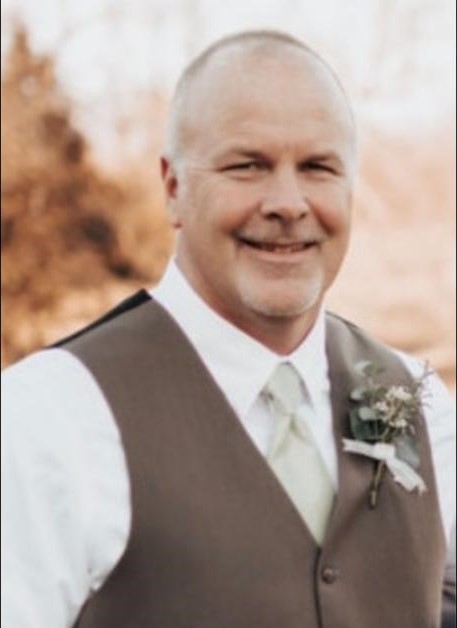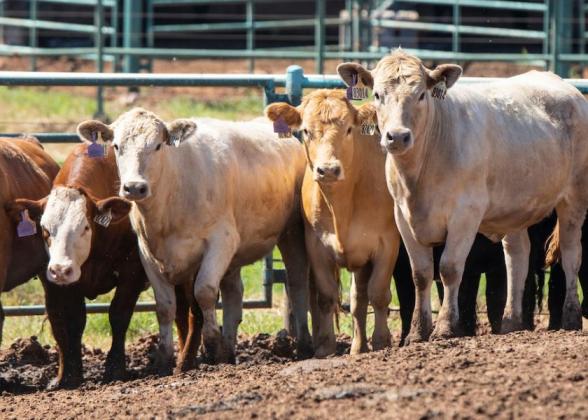
More than 100 investors — including at least 10 individuals and companies in Oklahoma and a prominent agricultural lender – were swindled in a massive cattle marketing fraud allegedly orchestrated by a Kentucky cattleman who committed suicide after his scheme was exposed, leaving his family facing financial ruin.
Losses incurred in the scandal – believed to be the second largest in cattle industry history – may exceed $100 million, bankruptcy filings of three companies owned by Brian Keith McClain indicate. Rabo AgriFinance claims it alone is owed more than $50 million, and the collapse of McClain’s operation apparently affected dozens of other cattle producers and lenders, too.
A group of McClain’s investors filed a lawsuit against him in Deaf Smith County District Court in Hereford, Texas.
The scam involved nearly 80,000 “ghost” cattle, court records indicate. Some cattle producers sold loads of cattle and their checks bounced as the Ponzi scheme unraveled.
McClain, 52, of Benton, Kentucky, committed suicide on April 18. Beef Magazine cited sources who said two others connected with the case – a commodity broker as well as one investor – also killed themselves.
In a story published in Drovers magazine, Greg Henderson wrote that McClain’s scheme “allegedly dates back six years when – as sources told Drovers under condition of anonymity due to the nature of the allegations – he began seeking investors for his cattle operations with the ‘guarantee’ of a 30% return on investment. Over time, McClain’s inventory of cattle grew, and some investors did see hefty profits. But those investors were apparently paid with more borrowed money.”
A lawsuit Rabo AgriFinance filed last month related that in December 2022, McClain’s paper inventory listed 89,522 head of cattle with a borrowing base of $97.2 million as collateral. Two months later both numbers had declined precipitously, to 37,992 head of cattle with a borrowing base of $36.7 million.
A “collateral inspection” Rabo conducted on April 4 “revealed that there were only 7,481 head of cattle in Texas and 3,094 head of cattle in Kentucky,” for a total count of 10,575. Thus, the number of cattle pledged as collateral had dwindled by almost 79,000, with an estimated value of $85 million.
McClain Farms Inc. based in Benton, Kentucky; 7M Cattle Feeders, a yard in Friona, Texas, with a capacity for 115,000 head of cattle; and McClain Feed Yard, a 3,000-head operation based in Hereford, Texas – all of which were owned by Brian K. McClain – filed Chapter 7 liquidation bankruptcy in the U.S. Bankruptcy Court for the Northern District of Texas on April 28.
At least 102 creditors from 14 states (including Texas, Kansas, Kentucky, Iowa and Oklahoma) and Alberta, Canada, are owed money by McClain’s companies, and both McClain feed yards reportedly are now closed.
The creditors include Oklahoma AgCredit in Broken Arrow; AgTexas PCA in Amarillo, Texas; Frontier Farm Credit in Manhattan, Kansas; Lazy J Arena in Stillwater, Cactus Feeders Finance LLC, First Capital Bank of Texas, and Caterpillar Financial Services Corp., a subsidiary of Caterpillar Inc. construction equipment manufacturer.
Other Oklahoma creditors are in Ringling, Ardmore, Healdton and Perry.
Court documents indicate almost all of the creditors are owed money by all three of the companies.
Rabo sues McClain’s companies, estate for $52.6 million
Rabo AgriFinance, of St. Louis, Missouri, filed suit against the three McClain companies, the estate of Brian K. McClain, plus Wildforest Cattle Co. and MAP Enterprises, both in Mayfield, Kentucky. The lawsuit was filed April 25 in the U.S. District Court for the Western District of Kentucky.
Rabo claims McClain and his three companies owed it $52.6 million as of April 5. Court records indicate that amount included:
• An unpaid balance of $51.345 million in principal and interest on a $54 million operating line of credit extended to McClain on Jan. 13, 2023.
• An unpaid balance of $898,314 on a $1,019,800 real estate loan secured on Aug. 27, 2021.
• An unpaid balance of $179,476 on a $625,000 real estate loan approved on July 24, 2019.
• An unpaid balance of $184,867 on a $332,500 real estate loan extended on May 11, 2018.
In their bankruptcy petitions, the McClain companies’ estimated assets range from $1 million to $10 million, while estimated liabilities range from $50 million to $100 million.
McClain failed to make a required $6 million principal reduction payment April 1 on his secured line of credit with Rabo.
McClain’s accounts at Mechanics Bank held a collective balance of $22.369 million on April 7, Rabo informed the district court.
On April 7 and in subsequent days a series of “chargebacks” and “cancellations” were “taken on the accounts.” As of April 11, McClain’s accounts at Mechanics Bank were overdrawn by more than $7.4 million, ledgers reflect.
As of May 9, McClain’s bank accounts had “a zero balance,” Rabo wrote in a document filed with the Kentucky district court.
On April 20 – two days after Brian McClain killed himself and several days after McClain was in default on his loans – Rabo AgriFinance discovered that McClain’s companies sold at least 20,000 head of livestock to MAP Enterprises and Wildforest Cattle Co. Furthermore, the proceeds – which Rabo estimated at “no less than $20 million” – were not remitted to Rabo.
“There’s some money out there somewhere,” said one investor who spoke to Southwest Ledger on the condition of anonymity. “Maybe it’s buried in a back yard.”
Rabo requests records
Rabo filed a 111-page subpoena request with the Texas bankruptcy court on May 9, seeking documents from various individuals and companies, including:
• Chelsea McClain, Brian’s widow and cosigner on the loans to his three companies; Crystal McClain, Brian’s ex-wife; Meagan B. Goad/Powell and Kinsey Moreland, Brian McClain’s daughters who were employed by all three of his companies and have “knowledge of” their financial affairs.
• Mechanics Bank, a depositor bank for all three of McClain’s companies and holder of their deposit accounts; and Whitlock CPA, a Kentucky accounting firm that worked for MAP and Wildforest and “signed MAP Enterprises’ checks that were then deposited” into McClain’s Mechanics Bank accounts in early April 2023.
• 2B Farms, in Texas, which reportedly owed McClain and his companies $4,046,000; Community Financial Services Bank, in Kentucky, the depository bank for MAP Enterprises and Wildforest Cattle Co.
• MAP Enterprises, which had “substantial financial dealings” with McClain and his companies and owed them approximately $12,933,000; and Wildforest Cattle Co., which had “substantial financial dealings” with McClain and his companies and owed them approximately $8,543,000. The court was informed that MAP and Wildforest “appear to be entities with no actual physical business locations or ongoing business operations…”
Rabo AgriFinance also requested permission to subpoena records from the Texas and Southwest Cattle Raisers Association. Rabo believes “special rangers” with the TSCRA “oversaw the removal of” more than 3,000 head of cattle from McClain’s property between April 18 and 21.
McClain Farms, 7M Cattle Feeders and McClain Feed Yard – “with Brian McClain at the helm” – engaged in “a massive fraud” prior to filing for bankruptcy on April 28, Rabo contends.
Many investors have little hope
On May 3 the U.S. Department of Agriculture’s Agricultural Marketing Service urged anyone who sold livestock to but has not received payment from McClains Farms Inc., 7M Cattle Feeders Inc., McClain Feed Yard Inc., or Brian McClain, “should file Dealer Trust claims immediately.”
Unpaid livestock sellers “may be protected under a provision of the Packers and Stockyards Act of 1921 that requires all livestock purchased by a dealer in cash sales, and all receivables or proceeds from such livestock, to be held in trust for the benefit of all unpaid cash sellers,” the AMS said.
Cattle market sources told Oklahoma Farm Report that if a cattle purchase was made through a livestock market or a commission firm like that found at the Oklahoma National Stockyards, the seller of the cattle would be protected from a bad payment by one of McClain’s companies that might have issued a check that bounced. The market or commission firm would be bonded and have funds to protect the original cattle owner. But a cattle producer who made a direct private treaty sale would have no such protection.
Ron Hays from the Radio Okla. Ag Network contributed to this report.


